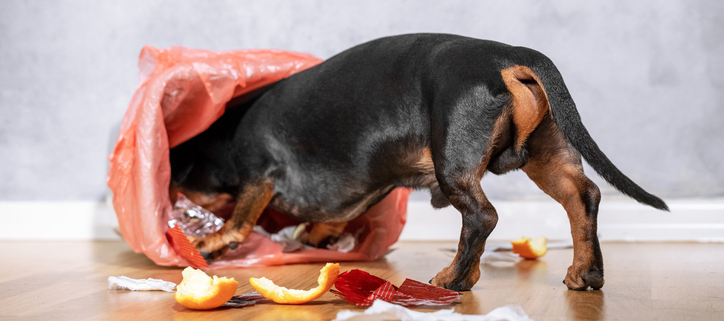Trash Trouble: Understanding Why Dogs Get Into the Garbage
For many dog owners, coming home to find the trash scattered across
the floor is a frustrating and all-too-common occurrence. While it may
seem like mischievous behavior, dogs getting into the trash is often
driven by instinctual and behavioral factors. Dogs have a keen sense
of smell and are naturally drawn to the enticing odors emanating from
the garbage. The aroma of food scraps, discarded wrappers, and other
tantalizing scents can be irresistible to a curious canine, prompting
them to explore the trash in search of tasty treats.
Another reason dogs may get into the trash is boredom or anxiety. Dogs
left alone for extended periods or lacking mental and physical
stimulation may resort to scavenging behavior as a way to alleviate
boredom or relieve stress. For some dogs, getting into the trash
becomes a form of entertainment or a way to pass the time while their
owners are away. Additionally, dogs may associate the act of rummaging
through the trash with a rewarding outcome, such as finding a
discarded snack, reinforcing the behavior, and making it more likely
to recur in the future.
Addressing the issue of dogs getting into the trash requires a
multi-faceted approach that combines management strategies, behavioral
training, and environmental enrichment. Pet owners can start by
securing trash cans with lids that are difficult for dogs to open or
investing in dog-proof trash containers. Additionally, providing ample
mental and physical stimulation through interactive toys, regular
exercise, and obedience training can help alleviate boredom and
prevent destructive behaviors like getting into the trash.
Consistency, patience, and positive reinforcement are key to modifying
your dog’s behavior and fostering a harmonious living environment for
both pets and humans.
For many dog owners, coming home to find the trash scattered across
the floor is a frustrating and all-too-common occurrence. While it may
seem like mischievous behavior, dogs getting into the trash is often
driven by instinctual and behavioral factors. Dogs have a keen sense
of smell and are naturally drawn to the enticing odors emanating from
the garbage. The aroma of food scraps, discarded wrappers, and other
tantalizing scents can be irresistible to a curious canine, prompting
them to explore the trash in search of tasty treats.
Another reason dogs may get into the trash is boredom or anxiety. Dogs
left alone for extended periods or lacking mental and physical
stimulation may resort to scavenging behavior as a way to alleviate
boredom or relieve stress. For some dogs, getting into the trash
becomes a form of entertainment or a way to pass the time while their
owners are away. Additionally, dogs may associate the act of rummaging
through the trash with a rewarding outcome, such as finding a
discarded snack, reinforcing the behavior, and making it more likely
to recur in the future.
Addressing the issue of dogs getting into the trash requires a
multi-faceted approach that combines management strategies, behavioral
training, and environmental enrichment. Pet owners can start by
securing trash cans with lids that are difficult for dogs to open or
investing in dog-proof trash containers. Additionally, providing ample
mental and physical stimulation through interactive toys, regular
exercise, and obedience training can help alleviate boredom and
prevent destructive behaviors like getting into the trash.
Consistency, patience, and positive reinforcement are key to modifying
your dog’s behavior and fostering a harmonious living environment for
both pets and humans.



